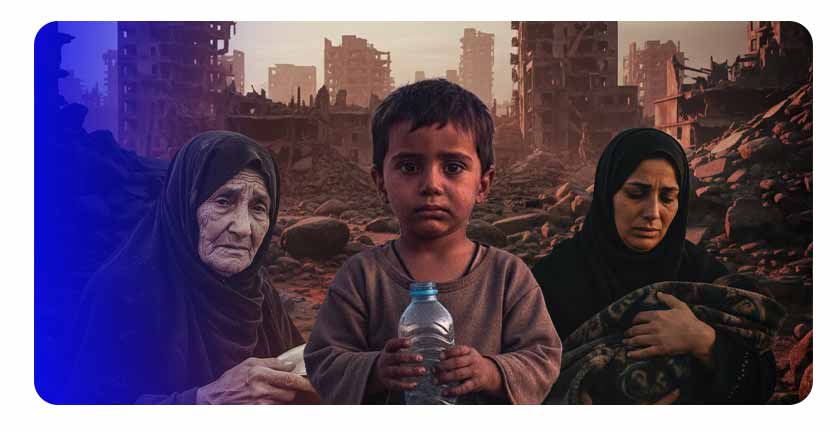
Gaza Strip – Media Office | 12 October 2025
Two years after the Israeli aggression on the Gaza Strip, the humanitarian catastrophe continues to worsen daily amid ongoing blockade and destruction of essential life infrastructure.
According to the Ministry of Health in Gaza, in its weekly report titled "Damage from the Aggression and Humanitarian Priorities," over two million people are living through one of the worst humanitarian disasters in modern history.
The report states that casualties have exceeded 67,800, with more than 170,000 civilians injured, including thousands of children and women. The statistics are alarming:
56,348 women widowed.
21,193 children lost one or both parents.
460 deaths due to hunger and malnutrition, including 154 children.
12,000 cases of miscarriage due to lack of health and nutritional care.
The report warns of imminent famine threatening hundreds of thousands of children, with an estimated 650,000 children at risk of dying from hunger. The blockade prevents entry of over 250,000 cans of infant milk per month, worsening the health and nutrition crisis. Additionally, 540 humanitarian workers have died performing relief tasks.
Agriculture in Gaza has nearly collapsed, with 94% of agricultural land destroyed and more than 665 farms ruined, alongside 1,223 agricultural wells. Annual vegetable production dropped from 405,000 tons to 28,000 tons, and fishery production halted completely.
Hospitals face tragic conditions: over 19,000 injured require long-term treatment, including:
4,800 amputations
1,200 paralysis cases
1,200 cases of vision loss
350,000 chronic patients face life-threatening situations due to drug shortages, including 17,000 cancer patients without treatment. The report recorded 788 attacks on medical facilities, destruction of 38 hospitals, 96 healthcare centers, and 197 ambulances.
The war displaced over two million civilians due to forced eviction policies, with 268,000 housing units destroyed completely, 148,000 uninhabitable, and 153,000 partially damaged. 293 shelters were directly targeted, leaving hundreds of thousands without safe accommodation.
Schools and universities were not spared: 165 educational institutions destroyed completely, 392 partially, making 90% of schools in need of reconstruction. 13,500 students, 830 teachers, and 193 academics lost their lives.
The occupation destroyed 725 central water wells, 134 freshwater projects, and over 700,000 meters of water and sewage networks, leaving hundreds of thousands without potable water or basic sanitation.
The Ministry of Health highlighted critical needs to alleviate suffering, including:
Food and Water:
Food baskets, flour, hot meals
Safe drinking water
Shelter:
Tents, blankets, kitchen utensils
Fuel for cooking
Health:
Medicines and medical supplies
Hospital fuel
Infant milk and diapers
Psychosocial support
Education:
Stationery and teacher support
Educational sponsorship for displaced children
Water and Sanitation:
Fuel for pumping stations
Drinking water distribution projects
The report emphasizes that Gaza is facing one of the worst human